最新译林牛津版小学英语四年级下册unit3 My day第二课时重点习题
译林版(三起)四年级下册英语 Unit 3 My day 单元测试题
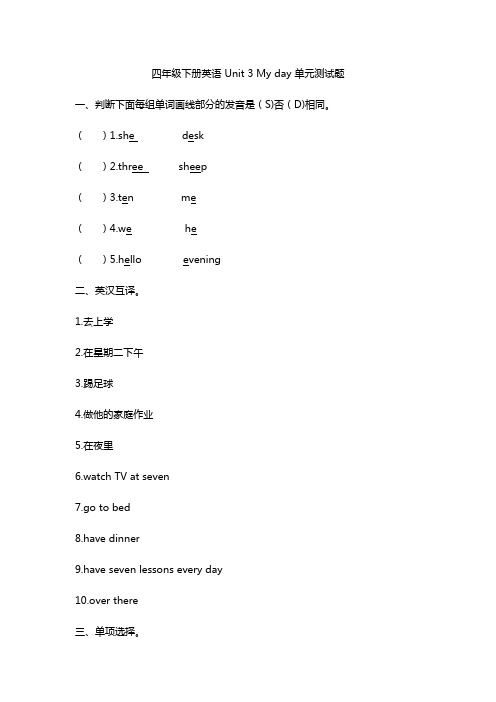
四年级下册英语 Unit 3 My day 单元测试题一、判断下面每组单词画线部分的发音是(S)否(D)相同。
()1.she desk()2.three sheep()3.ten me()4.we he()5.hello evening二、英汉互译。
1.去上学2.在星期二下午3.踢足球4.做他的家庭作业5.在夜里6.watch TV at seven7.go to bed8.have dinner9.have seven lessons every day10.over there三、单项选择。
()- do you play football? -At four thirty in the afternoon.A.WhereB.WhatC.When()2.- is it? -It's eight o'clock.A.WhatB.What timeC.What's time()3.I go to bed at ten night.A.atB.inC.on()4.-What you see over there? -I can see some trees.A.isB.canC.are()5.-Let's now. -OK.A.go schoolB.go to schoolC.go to home ()6.- a big cake! -Yes,it is.A.What'sB.HowC.What()7.I do homework in the evening.A.meB.IC.my()8.Look!This is day.A.Mike'sB.MikeC.you ()9.- they? -They're Wang Bing and Su Hai.A.Where areB.Who isC.Who are ()10.I usually at six in the evening.A.have dinnerB.have lunchC.have breakfast四、选词填空。
2024年译林版四年级英语下册课件Unit3Myday
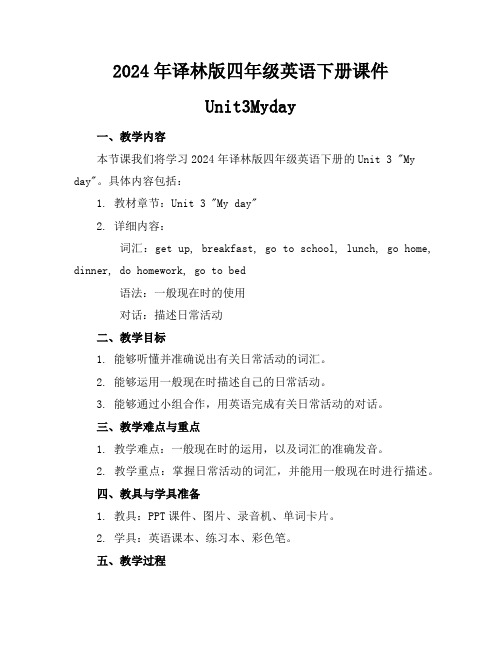
2024年译林版四年级英语下册课件Unit3Myday一、教学内容本节课我们将学习2024年译林版四年级英语下册的Unit 3 "My day"。
具体内容包括:1. 教材章节:Unit 3 "My day"2. 详细内容:词汇:get up, breakfast, go to school, lunch, go home, dinner, do homework, go to bed语法:一般现在时的使用对话:描述日常活动二、教学目标1. 能够听懂并准确说出有关日常活动的词汇。
2. 能够运用一般现在时描述自己的日常活动。
3. 能够通过小组合作,用英语完成有关日常活动的对话。
三、教学难点与重点1. 教学难点:一般现在时的运用,以及词汇的准确发音。
2. 教学重点:掌握日常活动的词汇,并能用一般现在时进行描述。
四、教具与学具准备1. 教具:PPT课件、图片、录音机、单词卡片。
2. 学具:英语课本、练习本、彩色笔。
五、教学过程1. 引入:利用图片展示不同的日常活动,引导学生用中文进行描述。
引导学生关注图片中的活动,为新课学习做好铺垫。
2. 新课展示:呈现PPT课件,展示本节课的学习内容。
教师通过录音机播放听力材料,让学生跟读并模仿。
教师引导学生学习词汇,并让学生进行小组合作,完成对话练习。
3. 例题讲解:教师讲解一般现在时的用法,并通过例句进行解释。
教师示范如何用一般现在时描述日常活动,并让学生模仿练习。
4. 随堂练习:学生根据教师提供的场景,用一般现在时描述自己的日常活动。
教师选取部分学生的描述进行点评,并给予指导。
5. 小组活动:学生分为小组,根据所给话题,用英语完成对话。
各小组进行展示,教师给予评价和鼓励。
六、板书设计1. Unit 3 "My day"2. 词汇:get up, breakfast, go to school, lunch, go home, dinner, do homework, go to bed3. 语法:一般现在时的使用4. 对话示例:描述日常活动七、作业设计1. 作业题目:用一般现在时描述自己的周末活动。
四年级下册英语试题-Unit3 my day 译林版 无答案
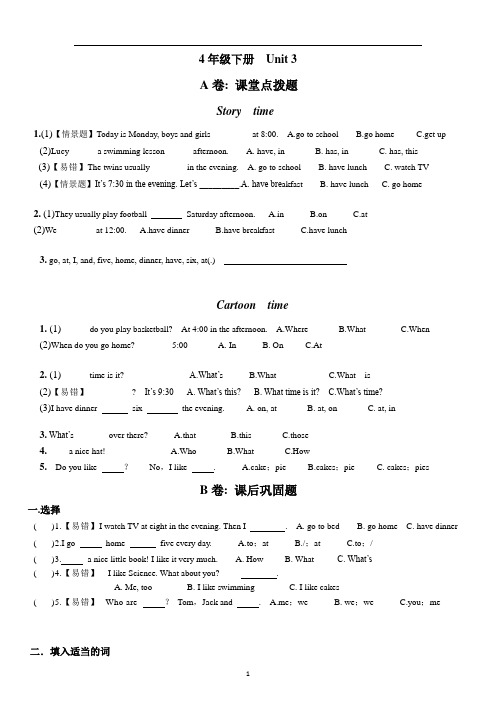
4年级下册Unit 3A卷: 课堂点拨题Story time1.(1)【情景题】Today is Monday, boys and girls _________at 8:00. A.go to school B.go home C.get up(2)Lucy______ a swimming lesson ______afternoon. A. have, in B. has, in C. has, this(3)【易错】The twins usually ________in the evening. A. go to school B. have lunch C. watch TV(4)【情景题】It’s 7:30 in the evening. Let’s _________.A. have bre akfast B. have lunch C. go home2.(1)They usually play football Saturday afternoon. A.in B.on C.at(2)We ________ at 12:00. A.have dinner B.have breakfast C.have lunch3. go, at, I, and, five, home, dinner, have, six, at(.)Cartoon time1. (1) ______do you play basketball? At 4:00 in the afternoon. A.Where B.What C.When(2)When do you go home? ______ 5:00 A. In B. On C.At2. (1) ______time is it? A.What’s B.What C.What is(2)【易错】__________? It’s 9:30 A. What’s this? B. What time is it? C.What’s time?(3)I have dinner six the evening. A. on, at B. at, on C. at, in3.What’s________over there? A.that B.this C.those4._____a nice hat! A.Who B.What C.How5.---Do you like ?---No,I like . A.cake;pie B.cakes;pie C. cakes;piesB卷: 课后巩固题一.选择( )1.【易错】I watch TV at eight in the evening. Then I . A. go to bed B. go home C. have dinner ( )2.I go home five every day. A.to;at B./;at C.to;/( )3. a nice little book! I like it very much. A. How B. What C. What’s( )4.【易错】---I like Science. What about you? --- .A. Me, tooB. I like swimmingC. I like cakes( )5.【易错】--Who are ?Tom,Jack and . A.me;we B. we;we C.you;me 二.填入适当的词1.big(反义词)2.go(反义词)3.girl(对应词)4.this(反义词)5.I(复数)6.he(对应词)7.isn’t(完全形式)8.can’t(完全形式)9.I’d(完全形式) 10.aren’t (完全形式) 11. they(单数)12.have(第三人称单数形式) 13.like(第三人称单数形式) 14.these(单数形式)15.Saturday(缩写形式) 16.you (物主代词) 17.like(同义词)18.I don’t have (some/any) new pens.19.Do you have (some/any) lessons on Saturday?20.I like (panda/pandas). What (about/for) you?21.Look at (this/these) pigs. They (is/are) cute and fat.三.翻译1.起床_________2.一节数学课___________3. 在早上_____________4.回家_________5.我的一天_________6.12:15_________7.每个星期六_________8.这个星期三_________9.四节数学课_________ 10.在7:30_________ 11.在星期二晚上_________ 12.做我的家庭作业_________ 13.一个大蛋糕14.have dinner with me15.迈克星期三有六节课。
四年级英语下册Unit 3 My day(Fun time-Cartoon time)译林版
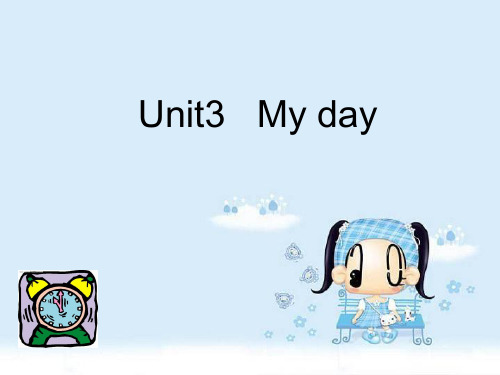
Q: What’s the matter with Bobby? (Bobby 怎么啦?)
He’s hungry.
Watch the cartoon, answer the question: (看动画,回答问题)
Q1. When does Bobby have dinner every day? Q2. __d_in_n__e_r __
at _s_i_x_f_i_ft_e_e_n___ and __w__a_tc_h__T_V_____at seven.
I _g_o__to__b_e_d__at nine___e_v_e_ry__d_a_y__.
When do you……? I at (时间) .
Q2. What do they see?
A cake
What a big cake! 你能试着读出他们的语气吗?
Read yourselves,answer the question
自读课文,找出问题的答案
Q: What time is it now?
Read after the tape
I have two lessons _in__t_h_e_a_f_te_r_n_o_o_n_.
I _p_l_a_y_f_o_o_t_b_a_ll at four and _g_o__h_o_m__e______at __f_iv_e__th__ir_ty_______.
I do my _h_o__m_e_w__o_rk__at _f_iv_e__th_i_rt_y____.
When do you…?
I … at 时…间
Activity
在
get up
Time 6:30
have breakfast
小学英语牛津译林苏教版四年级下册(新版)Unit3 My day全单元教案

Unit3 My dayTeaching content本单元主要内容是谈论我的一天。
教学重点是句型如When do you get up/…?I usually… at…在二年级教材中,学生已学过morning, afternoon 等词,在教学时,可以适当利用这些词,或以旧引新,或拓展延伸,做到新旧知识的融会贯通。
根据学生的年龄特点,教师可以采用游戏的方式,让学生在愉悦轻松的氛围中掌握所学知识。
Teaching aims and learning objectives这节课学完后学生应达到的目标一、能听懂、能理解、会读课文。
二、能听懂、会说、会读单词usually, go to school, in the morning, in the evening, in the afternoon, go home, homework, watch TV, have four lessons, have lunch, play football, do my homework, have dinner, go to bed, every day三、初步理解、会读句型:When do y ou get up/…?I usually… at… .用今天所学的内容,在实际生活能用英语表述自己一天的生活Focus of the lesson and predicted area of difficulty一、能听懂、会说、会读句型::When do you get up/…?I usually…at…在语境中的正确运用。
二、能听懂、会说、会读单词:go to school, usually, in the morning,have lunch, go home, do my homework, have dinner, watch TV,go to bed三、掌握字母e和字母组合ee在单词中的读音Teaching arrangementFive periodsTeaching proceduresStep1 Greeting and warm upT: Good morning, class.Ss: Good morning.T: Do you like games? Let’s play a game: Yeah, yeah, yeah, or No, no ,no.1.It’s Monday today.2.We have 4 lessons in the morning.3.We have a PE lesson in the afternoon.4.I like Music.5.I go to school every day.6.It’s six o’clock. It’s time for English class.Step2 Presentation1.Show six clocks, review the time6:15 7:05 11:45 5:00 6:20 10:00T: What time is it? It’s six fifteen in the morning…. (复习时间,并将钟面贴在黑板)Guess: What do I usually do at 6:15 in the morning?Ss: get up/have breakfast…T: I usually get up at 6:15板书:I(usually)…at…Teach: usuallyWhen do you get up?Ss: I get up at…2.In the same way to teach:go to school at 7:05have lunch at 11:45have dinner at 6:20go to bed at 10:003. T: I do different things at different time.(Chant)I get up at six fifteen.I go to school at seven o five.I have lunch at eleven fifteen .I go home at five.I have dinner at six twentyI go to bed at ten.So this is my day.揭题:Unit 3 My day4. Talk in groups. Make a new chant, say something about your day.Step3 Story timeT: We’re having an English lesson and we’re talking about our days.Mike is talking about his day too. Let’s listen to Mike, try to findout Mike’s activities in the morning.(Part1)Ss listen and then choose the pictures.(出示五幅图:起床、看电视、上学、睡觉、吃午饭,学生听第一段,根据Mike的介绍选出早上的活动)1.Listen again and match(再听一遍介绍,出现三个钟面,将Mike的活动与时间配对)2.T: What else does Mike do in the morning?Ss: have lessonsT: Yes. And how many lessons does he have in the morning.Ss: Four.T: So Mike has four lessons in the morning.(Part2)1.T: How many lessons does Mike have in the afternoon? And what elsedoes Mike do in the afternoon? Let’s listen again, and try to answer.Q1. How many lessons does Mike have in the afternoon?Q2. What else does Mike do in the afternoon?Teach: go homedo my homeworkIn the afternoon: have lessons/play football/go2.Listen and read Part 2(Part3)1.Read Part3 by selves, try to fill in the blanks.2. Talk in groups: When does Mike do these things? Say like this:…at…3.Listen and read Part3Step 4 Consolidation1.Read in three.2.Act as Mike, choose one part and talk about your activity.(三人一小组,扮演Mike,选择早、中、晚其中一个时间说说自己的活动)Step 5 Homework1.Listen and read the story, try to recite it.2.Describe your day to your family, then write it down. Blackboard designUnit 3 My day2.o’clock?(出示图片剪影)Guess!Ss: He gets up at seven.3. (出示另一个钟面)Teach:go to school in the same way.And what about this one?Ss: go to schoolTeach: get up/ go to school3.T: What does Mike usually do in the afternoon? Show two pictures.Ss: He …Teach:play football at four/go home at four forty in the afternoon.4:Show three pictures(have dinner/watch TV/go to bed)How about in the evening or at night? Please talk in groups. Then teachthese phrases according to their answers:Have dinner at six thirteenWatch TV at seven in the eveningGo to bed at nine at night4.Retell Mike’s day according to these picturesStep 3 Fun time1.Show a timetable and finish it.T: Do you want to know something about my day? You can ask me like this:Teach: When do you…?Ss: When do you get up?T: I get up at six in the morning.Ss ask ,T answers and draw the clocks.2.T: Look ,this is my day.(Introduce the T’s day)How about yours?4.Ask and answer in pairs(同桌各自询问对方的timetable。
译林版四年级下册 Unit3(含中文翻译)
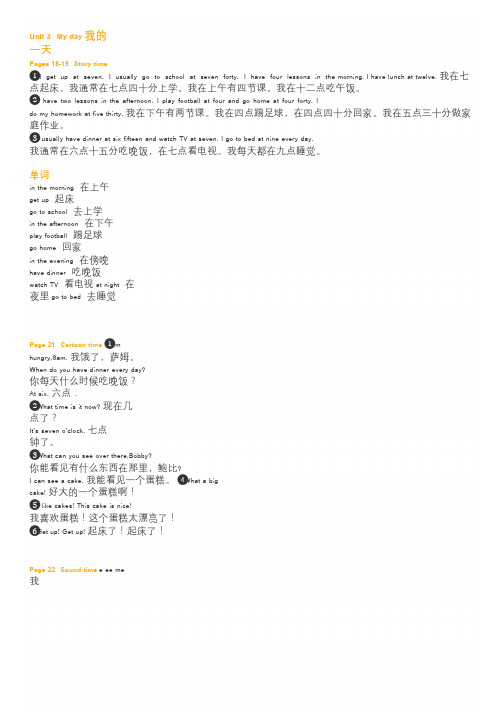
Unit 3 My day 我的一天Pages 18-19 Story time❶I get up at seven. I usually go to school at seven forty. I have four lessons in the morning. I have lunch at twelve. 我在七点起床。
我通常在七点四十分上学。
我在上午有四节课。
我在十二点吃午饭。
❷I have two lessons in the afternoon. I play football at four and go home at four forty. Ido my homework at five thirty. 我在下午有两节课。
我在四点踢足球,在四点四十分回家。
我在五点三十分做家庭作业。
❸I usually have dinner at six fifteen and watch TV at seven. I go to bed at nine every day.我通常在六点十五分吃晚饭,在七点看电视。
我每天都在九点睡觉。
单词in the morning 在上午get up 起床go to school 去上学in the afternoon 在下午play football 踢足球go home 回家in the evening 在傍晚have dinner 吃晚饭watch TV 看电视 at night 在夜里 go to bed 去睡觉Page 21 Cartoon time ❶I’mhungry,Sam. 我饿了,萨姆。
When do you have dinner every day?你每天什么时候吃晚饭?At six. 六点.❷What time is it now? 现在几点了?It’s seven o’clock. 七点钟了。
❸What can you see over there,Bobby?你能看见有什么东西在那里,鲍比?I can see a cake. 我能看见一个蛋糕。
译林版四年级下册英语Unit3《My day》教学反思-最新

译林版四年级下册英语Unit3《My day》教学反思
本单元的教学内容主要是帮助学生学会表达自己在什么时间做的什么事情。
在导入的时候,我以自己为例,阐述了一下自己的一天,并且将所做的事情与时间统一的板书在黑板上,让学生一目了然。
然后,我让学生根据我的格式将自己的时间表也写在黑板上,两者之间进行对比。
同时注意介词at的用法以及位置的介绍。
然后引出本课的主人翁Mike,非常的顺利,学生也都能较好的理解。
在第二课时的时候开始渗透句型when do you …?并结合板书,采取教师示范演说,学生逐个模仿的形式来操练句型。
为了帮助学生记住句型我总结出:看到when 我们要到答句当中去寻找at.同时补充介绍when 与 what time之间的区别与联系,在做题的过程中给予一定的指导,后来发现学生对于when的理解比较深刻,而对于what time 的运用缺乏一定的意识性。
经过几次的练习反馈,在这方面还要增加一定的练习。
本单元我们也开始接触到第四单元的重点句型,在内容的渗透上要把握好一定的度,不能喧宾夺主。
总的来说,学习完这一单元之后,学生大多数能够正确的阐述自己的日常生活,但是词组的记忆仍然是一个难点,虽然读音不是问题,但是单词的拼写对于四年级的学生来说,相对较难。
可能需要很长一段时间的不断训练,不断听写,才能取得比较好的结果。
新译林版四年级下册英语unit3 My day知识点
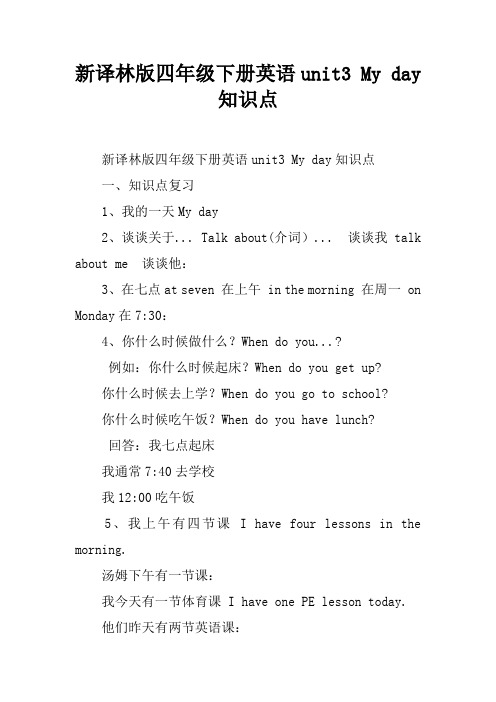
新译林版四年级下册英语unit3 My day知识点新译林版四年级下册英语unit3 My day知识点一、知识点复习1、我的一天My day2、谈谈关于... Talk about(介词)... 谈谈我 talk about me 谈谈他:3、在七点at seven 在上午 in the morning 在周一 on Monday在7:30:4、你什么时候做什么?When do you...?例如:你什么时候起床?When do you get up?你什么时候去上学?When do you go to school?你什么时候吃午饭?When do you have lunch?回答:我七点起床我通常7:40去学校我12:00吃午饭5、我上午有四节课 I have four lessons in the morning.汤姆下午有一节课:我今天有一节体育课 I have one PE lesson today.他们昨天有两节英语课:6、踢足球play football打篮球 play basketball7、做作业 do homework做家务 do housework我做我的作业 I do my homework.他做他的作业:8、吃晚饭 have dinner吃早饭:吃午饭:9、看电视 watch TV看电影 see a film 看书 read a book10、上床睡觉 go to bed11、在晚上 in the evening在夜里 at night晚安 Good night!12、现在几点了? What time is it now? 回答:现在七点It’s seven.今天几号?今天星期几?13、在那边over there14、可以看见一个蛋糕 can see a cake我可以看见一个蛋糕 I can see a cake. 他可以看见两只老虎:15、多大的蛋糕啊! What a big cake!16、我喜欢蛋糕 I like cakes.17、我们是谁?Who are we?你是谁?Who are you? 她是谁?Who is she?18、遇见李老师 meet Miss Li 遇见萨姆:二、音标1、读一读:meshegreensleepthree2、想一想:meshegreensleepthree3、学一学:音标档案姓名:【i: 】性别:长元音战斗策略:嘴唇微微张开,舌尖抵下齿,舌前部尽力向上抬起,嘴角向两边张开,露出微笑表情。
比如县四小四年级英语下册Unit3Myday知识梳理新版牛津译林版

Unit 3重点单词ually 通常,常常2.lunch 午饭3.home 家4.homework 家庭作业5.dinner 晚饭6.watch 观看7.evening 晚上 8.night 深夜重点短语1.in the morning 在上午2.in the afternoon 在下午3.in the evening 在晚上4.at night 在夜里5.go home 回家6.go to school 上学7.play football 踢足球8.have lunch 吃午饭9.have dinner 吃晚饭10.watch TV 看电视11.go to bed 睡觉12.what time 什么时候/几点13.do homework 做家庭作业14.at seven 在七点15.my day 我的一天16.over there 在那边17.have four lessons 有四节课重点句型1.I usually go to school at seven forty. 我通常七点四十去上学。
2.I have lunch at twelve. 我十二点吃午饭。
3.I have two lessons in the afternoon. 下午我有两节课。
4.I go to bed at nine every day. 我每天九点睡觉。
5.—When do you have breakfast every day? 你每天什么时候吃早饭?—At six thirty. 六点半。
6.—What time is it now? 现在几点?—It's seven o'clock. 七点。
7.—What can you see over there? 你看看那边是什么?—I can see a cake. 我能看见一个蛋糕。
8. What a big cake! 多么大的一个蛋糕啊!9. I like cakes! This cake is nice! 我喜欢蛋糕!这个蛋糕真不错!Recycle 1第一课时教学内容:教学目标:教学重点:让学生将1-3单元的中心语言融为一体,在具体情景中能自然运用。
新译林版小学四年级下册英语Unit3 My day Period 3
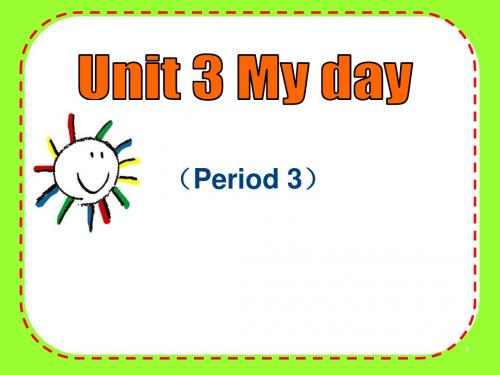
2
When do you get up? I get up at seven. When do you go to school? I go to school at seven forty. When do you have lunch? I have lunch at twelve. ……
3
When do you …? I …at …
see 看见 need 需要 jeep 吉普车 deep 深的 teeth 牙齿
We see some bees in the tree. Try to read these words in groups. 小组内试着读这些单词。 I feed the sheep near the jeep.
11
I know the sound of “e” and “ee”.
我知道字母 “e”和 “ee”的发音。
9
e ee
}
/i:/
me
she
green sleep three
Who are we ? Tom , Jack and me. We meet Miss Li at three.
10
he bee 蜜蜂 meet 遇见 feed 喂养 week 星期 sheep绵羊
15
When do you________, have lunch Peter, hei-lo-li, every day? When do you________, go home hei-lo-li, every day? have lunch twelve hei-lo-li,every day. I _________at_______, five I _________at______, hei-lo-li,every day. go home
译林版四年级英语下册Unit3 My day (period1-2)

play games 玩游戏
watch a film看电影
二、教学重点 (二)重点短语和句型
5、时间的表达 (1)整点时间:可在数字后接o’clock,也可省略o’clock。
如:six o’clock 六点,o’clock可以省略 (2)非整点时间:先小时后分钟。
如:nine fifteen 九点十五分
一、教学目标 4、能正确使用频率副词usually描述日常活动的频率。 5、能正确理解story time的内容,有感情地朗读并表演故 事。
二、教学重点 (一)重点单词
1、usually:通常,常常 一般放在be动词后面,行为动词前面。表示事情 的发生频率。与频率相关的单词还有:always 一 直,often经常,频率由高到低排列为:
8、have dinner意思是吃晚饭,一日三餐前不加冠词, 如:have breakfast,have lunch
二、教学重点 (二)重点短语和句型
9.问句:When do you...?用来询问他人的时间安排 答句:I usually ...at/in the...用来告诉别人自己通常在某个时刻做某事。 如:When do you get up every day?你每天几点起床?
in May在五月
二、教学重点
(二)重点短语和句型
4、日常活动类短语
go晚饭
go home回家
play football 踢足球
watch TV看电视
go to bed去睡觉
have lunch吃午饭 补充:have/eat breakfast吃早饭
二、教学重点 (二)重点短语和句型
6、at night和in the evening 的区别 at night在夜里,in the evening在晚上, night要比evening所指的时间晚。
译林牛津版四年级英语下册全册知识点归纳及练习

Unit 1 Our school subjects一.单词school 学校subject 科目,学科see 看到,看见Chinese 语文Maths 数学Art 美术Music 音乐Monday 星期一lesson 课二.词组welcome back to…… 欢迎回到…… nice to see you 见到你很高兴what subject 什么课程new time table 新的时间表/课程表our new time table 我们的新的时间表/课程表like Chinese 喜欢语文It's time for……是做什么的时候到了go to 去……go to the playground 去操场this morning 今天上午this afternoon 今天下午new subject 新课程what day 星期几what lesson 什么课our school subject 我们学校的课程三.句型1. What subjects do you like? 你喜欢什么课程?I like Chinese and Maths.我喜欢语文和数学。
2. Let’s go to the library.让我们一起去图书馆。
(Let’s=Let us)3. What lessons do we have this morning? 我们今天上午有什么课?We have Music and PE.我们有音乐和体育。
4.Idon’t like PE and Music. 我不喜欢体育和音乐。
(do n’t=do not)5. It’s time for PE. 该上体育课了。
(for+名词)It’s time to go to school. (to+动词/动词词组)It’s time to play basketball. It’s time to have an Art lesson . It’s time to have Art .6. 区别lesson 和subjectWhat _______ do you have this afternoon? I have eight ________ this morning.What _______ do you have this term(学期)? I have eight ________ at school.What _______ do you like? I like English and Maths.How many_______do you have this turm ? Eight.四.发音Aa /ei/ cake 蛋糕grape 葡萄make 做skate 滑冰table 桌子name 名字plate 盘子take 拿,带wake 醒来baby 婴儿五.练习(一)、单项选择。
Unit3Myday(2)四年级英语下册译林版三起

4:00 p.m. do my homework 9:45 p.m. go to bed
I get up at seven fifteen in the morning.
I do my homework at four o’clock in the afternoon.
I go to bed at nine forty-five in the evening.
Or: I go to bed at nine forty-five at night.
1. Fill in the blanks.
7:30 p.m.
A: _W__h_a_t_t_im_e__d_o_y_o_u_ have breakfast?
B: I have breakfast _a_t_ _se_v_e_n_t_h_ir_t_y_i_n_t_h_e_m_o_r_n_in_g___ .
2. Fill in the blanks.
6:20 p.m.
A: _W__h_a_t_t_im_e__d_o_y_o_u_ have dinner?
WHhoawt cisanthtehecyaksee?e?
DoesWHWBohohwWobabtihlsiyoktteiermhsaienetcgcaitssakh?keietes??cake?
The end
I get up at six thirty.
6:30
What time do you watch TV?
I watch TV at six fortyfive in the evening.
Let’s hear about Betty’s daily activities.
小学英语牛津译林版(一起)四年级下册Unit 3My day-章节测试习题
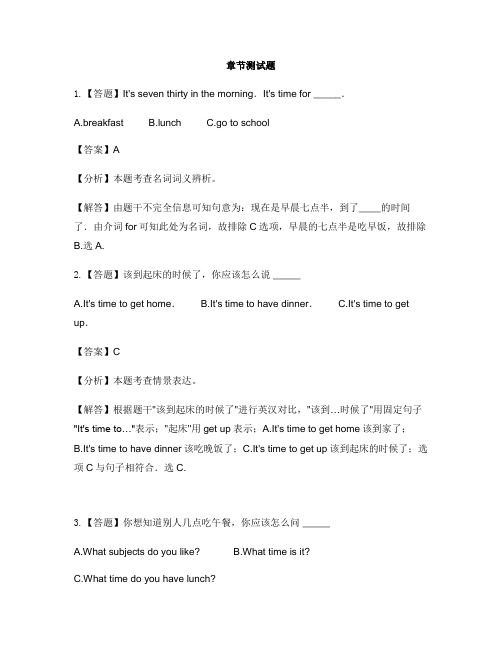
章节测试题1.【答题】It's seven thirty in the morning.It's time for _____.A.breakfastB.lunchC.go to school【答案】A【分析】本题考查名词词义辨析。
【解答】由题干不完全信息可知句意为:现在是早晨七点半,到了____的时间了.由介词for可知此处为名词,故排除C选项,早晨的七点半是吃早饭,故排除B.选A.2.【答题】该到起床的时候了,你应该怎么说 _____A.It's time to get home.B.It's time to have dinner.C.It's time to get up.【答案】C【分析】本题考查情景表达。
【解答】根据题干"该到起床的时候了"进行英汉对比,"该到…时候了"用固定句子"It's time to…"表示;"起床"用get up表示;A.It's time to get home该到家了;B.It's time to have dinner该吃晚饭了;C.It's time to get up该到起床的时候了;选项C与句子相符合.选C.3.【答题】你想知道别人几点吃午餐,你应该怎么问 _____A.What subjects do you like?B.What time is it?C.What time do you have lunch?【分析】本题考查情景询问。
【解答】What subjects do you like?你喜欢什么科目?What time is it?现在什么时间?What time do you have lunch?你几点吃午饭?选C.4.【答题】Let's ____ dinner together.A.haveB.hasC.having【答案】A【分析】本题考查动词原形。
2022年牛津译林版四年级英语下册Unit3试卷

译林版四年级英语下册Unit3试卷听力部分(30分)一、听录音,给下列图片标号。
(本大题共10小题,满分10分)()()()()()一、听录音,选择合适的应答句。
(本题共5小题,满分10分) ( )1. A. It’s Monday. B. It’s seven o’clock. C. I’m eleven.( )2. A. At home. B. At school. C. At seven.( )3. A. A bird. B. I can draw it. C. No, I can’t.( )4. A. Yes, I can. B. I can draw pictures. C. No, it isn’t.( )5. A. Well done. B. Good idea. C. Yes, I can.()1. A. It’s forty . B. It’s seven forty. C. I have three.()2. A. S orry, I can’t. B. I can see a cake. C. It’s over there.()3. A. I t’s nine o’clock. B. At seven fifteen. C. It’s late.()4. A. Time for dinner. B. I have lunch at eleven. C. I play table tennis.()5. A. M usic. B. I have English. C. I don’t like Maths.二、听录音,填入所缺单词。
(本大题共3小题,满分10分)1. A: What _______ is it now?B: It’s _______ o’clock.It’s time for _______.2. A: _______ do you _______ _______? B: At four forty.3. A: What _______ you _______? B: A _______.4. I can see some _______.笔试部分(70分)一、英汉互译。
译林版小学英语四年级下册课件:Unit 3 My day(共四课时)sc2.28

Read and judge
1.The cake is sbmigall and nice. ( F )
Let’s read
Get up ! Get up !
Read and judge
2.It’s time to get up. ( T )
2.能听懂、会说、会读单词:have lunch, play football, have dinner, go to bed, at night.
3.能进一步理解并运用句型:When do you…? I…at … 4.能正确理解、朗读并表演Cartoon time对话。
Play a game
游戏规则: 看到出现的图片, 快速说出对应的词组, 看谁说得又快又准噢!
Let’s learn
go to school
上学
I go to school at seven forty.
Let’s learn
play football
踢足球
I play football at four.
Let’s learn
go home
回家
I go home at four forty.
Listen and imitate
What can you see over there,
Bobby?
苦恼/惊喜 worried/surprised
I can see a cake.
Listen and imitate
What a big cake!
Listen and imitate
I like cakes. This cake is nice.
四年级下册英语Unit 3 My day知识梳理+巩固练习 译林版三起

Unit 3 My day知识梳理+巩固练习(含答案)一、语音解析:字母e及字母组合ee在单词中发/i:/,例如:例如:m e, sh e, gr ee n, sl ee p, thr ee二、重点单词四会usually通常,尝尝homework家庭作业三会morning早晨;上午lunch午饭afternoon下午home家dinner晚餐watch观看evening傍晚;晚上night夜;深夜there在那里read阅读;朗读三、核心短语go to school去上学go to bed睡觉in the afternoon在下午go home回家do my homework做我的家庭作业watch TV看电视in the evening在晚上my day我的一天have dinner吃晚饭at night在夜里play football踢足球have lunch吃午饭have four lessons上四节课every day每天over there在那边have breakfast吃早饭四、重点句型1. I usually go to school at seven forty.解析:usually意为“通常,常常”,是频度副词,常放在be动词之后,行为动词之前。
句型“主语十频度副词十动词(短语)十时间状语”用于表达某人在某时做某事的频率。
例句:I usually play table tennis after school.2. I do my homework at five thirty.解析:“做某人的家庭作业”一般用“do十形容词性物主代词十homework”来表达,其中的形容词性物主代词与主语在人称上要保持一致。
如果主语是第三人称单数,do要改为does。
此外,homework是不可数名词,在句子中作主语时,谓语动词要用第三人称单数形式。
例句:(l)We do our homework at home in the evening.(2)Liu Tao does his homework at six ten.3. evening和night的用法解析:evening意为“晚上;傍晚”,一般指下午六点到晚上就寝前的这设时间,其前一般用介词in。
[译林版]四年级英语下册分单元知识点练习
![[译林版]四年级英语下册分单元知识点练习](https://img.taocdn.com/s3/m/06e45bfe3b3567ec112d8a54.png)
Unit 1 Our school subjects (1)班级:姓名:学号:一、英汉互译。
1. 两门学科2. make a big cake3. 今天下午4. all like our teacher5. 是…的时间了6. my school subjects7. 一本美术书8. skate well9. 多少节数学课10.welcome to Suzhou二、选择题。
( ) 1. How many _______do you have this term(学期)?We have eight.A. subjectB. lessonC. subjectsD. lessons( ) 2. It’s time _______ English. Let’s go to the classroom(教室).A. atB. forC. inD. on( ) 3. What lessons do you have this morning? We _______ Chinese, Maths and Music.A. doB. have C are D is( ) 4. A: Do you have _____ PE lessons this week(星期)? B: Yes, I do.A. any B some C a D an( ) 5.The Science book is _______ the bedroom, ________ the chair.A on; inB in; onC at; onD in; in( ) 6. __________ a timetable for you.A. HereB. Here’s C .Here are D.It is( ) 7.Art and Science ________ fun.Ais B am C are D not( ) 8.A: How much is the book? B: _____________A It’s five.B They’re four yuan. C. It’s four yuan. D. They are four.( ) 9.—What ________ do you like? —I like English and Chinese.A.subjectB. subjectsC. a subjectD. an subjectUnit 1 Our school subjects(2)班级:姓名:学号:一、用所给词的适当形式填空。
- 1、下载文档前请自行甄别文档内容的完整性,平台不提供额外的编辑、内容补充、找答案等附加服务。
- 2、"仅部分预览"的文档,不可在线预览部分如存在完整性等问题,可反馈申请退款(可完整预览的文档不适用该条件!)。
- 3、如文档侵犯您的权益,请联系客服反馈,我们会尽快为您处理(人工客服工作时间:9:00-18:30)。
Period 2
【基础练习】
一.根据首字母提示,将句子补充完整。
1.I g ______ up at seven .
2.I have four lessons in the m ______.
3.I have d______ at six thirty.
4.I go to b ______ at nine every day .
5.I have l______ at twelve.
6.W______ t______ is it now?
7.I can m______ a cake.
二.根据中文提示补充句子。
1. 早上我们有两节课。
We have .
2. 我在下午六点写家庭作业。
I six .
3. 你什么时候回家? do you ?
4.我能看见一个大蛋糕。
I a .
5. 我每天晚上九点睡觉。
I at nine
day.
三.找出句子中的错误,并改正。
( ) 1. I go to bed in nine ? ____________
A B C
( ) 2. I have four lessons at the afternoon. ____________
A B C
( ) 3. I watch the TV at eight o’clock. ____________
A B C
( ) 4. I have dinner in evening. ? _______
A B C
【发展练习】
四.按要求改写句子。
1. I have at lunch at eleven fifteen.(对划线部分提问)
do you have lunch ?
2. I have at lunch at school.(对划线部分提问)
have lunch ?
3. I can play football. (改为一般疑问句,并做肯否定回答)
play football?
Yes, ./ No, .
答案:
一.1.get 2.morning 3.dinner 4.bed 5.lunch 6.What time 7.make 二.1.two lessons in the morning
2.do my homework at in the afternoon
3.When go home
4.can see big cake
5.go to bed every
三.1.C at 2.C in 3.B TV 4.C in the
四.1.What time 2.Where do you 3.Can you I can I can’t。
